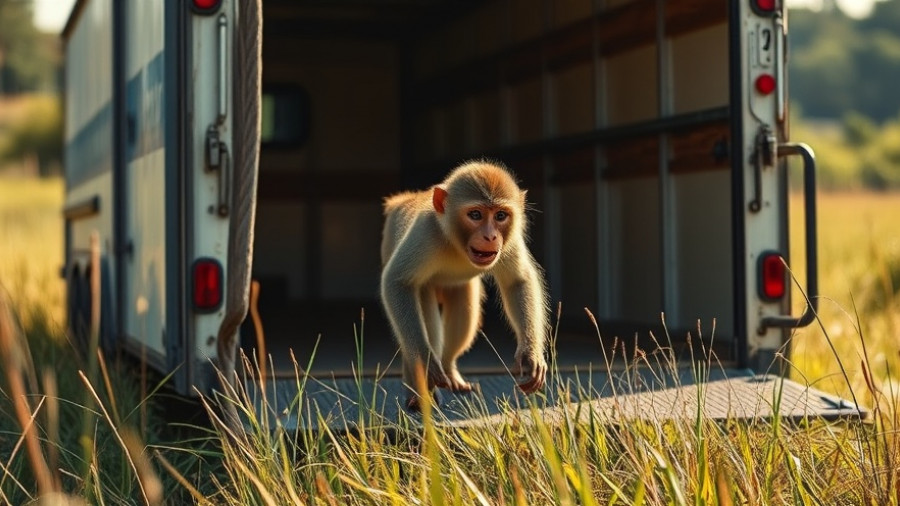
Chasing Shadows: The Recent Escape of Research Monkeys Raises Alarms
The shocking incident of a truck crash in Mississippi vividly illustrates the precarious intersection of animal research and public safety. A truck transporting rhesus monkeys from Tulane University crashed, resulting in several of the primates escaping into the surrounding area, sparking fears of potential disease transmission. As community residents react to the shocking news, it's crucial to comprehend both the immediate implications of such events and their broader ramifications.
Understanding the Risks: What Could Escape Mean for Public Health?
Reports of the escaped monkeys characterized them as “aggressive” and weighing approximately 40 pounds, with the Jasper County Sheriff's Office emphasizing that they required special handling protocols due to their potential to carry diseases such as hepatitis C, herpes, and COVID-19. Tulane University, however, has denied any infectious risk associated with these animals, asserting that the creatures belong to another research entity. This contradiction has led to confusion and fear among local residents, inciting calls for a thorough investigation.
The Ethics of Animal Research: A Double-Edged Sword
Events like this provoke not only fear but questions surrounding the ethical boundaries of animal research. PETA's response highlighted the vulnerability of these animals, emphasizing the moral implications of using primates for scientific research. The organization condemned the transport practices that led to the crash, voicing concerns that the continued use of monkeys in experiments could lead to public health crises. The situation raises a broader question about animal rights versus scientific advancement and the responsibilities of institutions that carry out such research.
Impact on Local Communities and Policy Implications
This incident serves as a critical reminder of the potential risks associated with transporting and using animals for research in populated areas. With only one monkey reportedly still on the loose, local officials continue to engage with animal disposal companies and provide updates, but the lasting impact on community sentiment towards biomedical research remains to be seen. Increased scrutiny regarding transport protocols and regulatory measures may emerge, prompting policymakers to evaluate the safety of animal research practices comprehensively.
Community Reactions: Fear and Uncertainty
Residents are understandably anxious about the safety implications of aggressive monkeys running free in their neighborhoods. Concerns extend beyond immediate health risks; for many, this incident might erode trust in both biomedical research institutions and local authorities. Emergency measures should be considered to alleviate public fears, including clear communications about the steps being taken to locate the remaining monkey and assure community safety.
Future Insights: Toward Preventive Measures in Research Transport
Looking ahead, there is a pressing need for improved standards in how research animals are transported. As the world faces growing health concerns in light of pandemics, incidents like this underscore the importance of scrutinizing transportation methods for potentially dangerous research specimens. Policies should advocate for better training among handling personnel, enhanced safety equipment, and protocols to mitigate risks to public health. The conversation sparked by this event could lead to significant advancements in both ethical guidelines and regulatory standards in animal research.
A Call for Awareness
While this incident occurred abruptly, it opens the door to critical dialogues around public health, ethics, and animal research. For small business owners particularly involved in health services, it's a reminder to maintain awareness of the surrounding environmental and community factors that impact operations. Vigilance in supporting ethical practices can contribute to the overall well-being of both businesses and their communities.
As a community, understanding these incidents prompts reflection on our collective values in the age of rapid research and scientific advancement. Safeguarding both public health and animal welfare should remain paramount in discussions surrounding animal research.
 Add Row
Add Row  Add
Add 




Write A Comment